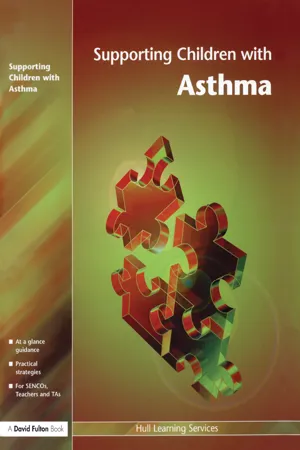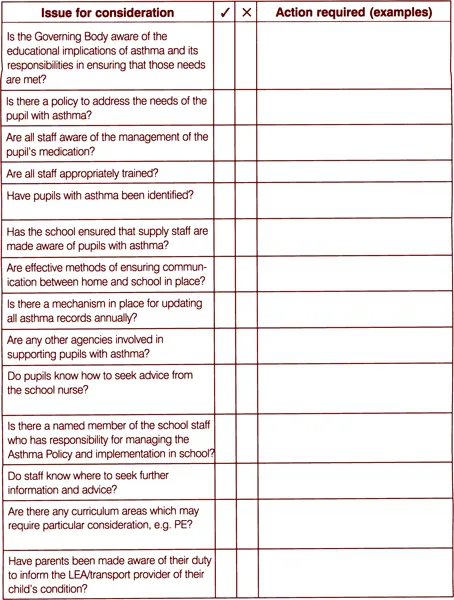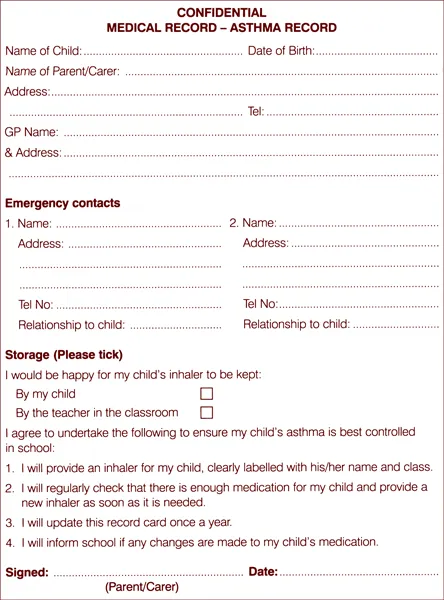
- 33 pages
- English
- ePUB (mobile friendly)
- Available on iOS & Android
eBook - ePub
Supporting Children with Asthma
About this book
Off-the-shelf support containing all the vital information practitioners need to know about Asthma, this book covers:
* What to do if a pupil has an attack
* Staff responsibility and school policy
* Subject specific do's and don'ts
* Specialist careers advice
Tools to learn more effectively

Saving Books

Keyword Search

Annotating Text

Listen to it instead
Information
Appendix 1:1
Issues for consideration

Appendix 1:2 (photocopiable sheet)
Issues for consideration

Appendix 2
Request for additional information
Dear Parent/Carer
We know that you, as the parent/carer of a child who suffers from asthma, or who has a problem with wheezing which requires treatment with an inhaler, are keen to ensure that your child receives the best possible care for this whilst in school.
This school takes its responsibilities seriously and has a School Asthma Policy in place for use by all staff. In order for us to manage your child’s condition effectively, we are asking all parents/carers of affected children to complete a confidential asthma record form. It will contain details of your child’s current treatment, emergency contact numbers for our use and outlines your responsibilities to ensure that your child’s condition is well managed.
Please complete the enclosed form and return it to me within 2 weeks. It will be held by the school and you will be asked to complete it once a year, or sooner if your child’s treatment changes. Thank you for your co-operation.
Yours sincerely
Head teacher
Appendix 3
Asthma record

Appendix 4
School Asthma and Inhaler Policy
This policy has been written with advice from the National Asthma Campaign, Department of Education and Employment and healthcare professionals.
Policy statement
This school recognises that asthma and recurrent wheezing are important conditions affecting many school children, and welcomes pupils with these conditions.
This school encourages children with asthma to achieve their full potential in all aspects of life by having a clear policy that is understood by school staff, their employers and pupils.
All staff who have contact with children with asthma are given the opportunity to receive training from the school nursing team. This training is updated at regular intervals.
Medication
Immediate access to inhalers is vital. Children are encouraged to carry their inhalers with them, at the discretion of the parent/teacher and depending on the maturity of the child. As a guideline we would recommend that:
Key Stage 1 | Inhalers will be kept by the teacher in the classroom in a designated place, of which pupils will be made aware. |
Key Stage 2 (and above) | Inhalers will be kept by the pupil. |
All inhalers will be labelled by the parent with the child’s name. Many children will identify for themselves the need to take their medication, and should be allowed to do so, as and when they feel it is necessary.
School staff are not required to administer medication, as it is self-administered. However, in an emergency it may become necessary to assist the child to take his/her medication. Staff who agree to do this, and act in accordance with this policy and its allied guidelines, will be insured by the Local Education Authority.
Record keeping
When a child joins the school, parents/guardians are asked if their child has asthma/recurrent wheezing. They are asked to complete a form giving details of the condition and the treatment required. Information from this form is used to compile an ‘Asthma Register’, which is available for all school staff. This form will be updated annually by the parents and in between times if medication changes are made.
Physical Education
Taking part in sports is an essential part of school life and children with asthma/recurrent wheezing are encouraged to participate fully in PE.
Symptoms of asthma are often brought on by exercise and therefore, each child’s labelled inhaler will be available at the site of the lesson.
Certain types of exercise are potent triggers for asthma/recurrent wheezing, e.g. crosscountry running. Any child who knows that this type of exercise does bring on symptoms, will be allowed to take an inhaler prior to exercise, carry it with him/her throughout and will be encouraged to gently warm up before the exercise.
School trips
No child will be denied the opportunity to take part in school trips/holidays because of asthma/recurrent wheezing, unless so advised by their GP.
Their reliever inhaler will be readily available throughout the trip, being carried either by the child or by the supervising adult whichever is more appropriate.
Group leaders need to be trained in the prevention of asthma, as well as the emergency management. They will have appropriate contact numbers with them.
Education
This school will be encouraged and supported by the School Health Care Team to include asthma education for pupils. This teaching will be allied to the Key Stages and therefore appropriate to their level of underst...
Table of contents
- Cover
- Title Page
- Copyright Page
- Table of Contents
- Foreword
- Acknowledgements
- Introduction
- Definition of asthma
- Prevalence and trends in asthma
- Triggers for asthma
- How to recognise an attack
- What to do if a pupil is having an asthma attack
- Action to take if an inhaler is missing, forgotten, empty
- Management of inhalers
- Treatments for asthma
- Inhaler techniques
- Educational issues
- Emotional issues
- Working effectively with parents
- Specific subject advice
- Specialist careers advice
- School staff: duties and responsibilities
- School policy
- Admission procedure
- Raising awareness about asthma in schools and the community
- A pupil’s perspective
- Useful contacts
- Reading list – books for children and books for parents/carers
- Appendix 1.1: Issues for consideration
- Appendix 1.2: Issues for consideration (photocopiable sheet)
- Appendix 2: Request for additional information
- Appendix 3: Asthma record
- Appendix 4: School Asthma and Inhaler policy
Frequently asked questions
Yes, you can cancel anytime from the Subscription tab in your account settings on the Perlego website. Your subscription will stay active until the end of your current billing period. Learn how to cancel your subscription
No, books cannot be downloaded as external files, such as PDFs, for use outside of Perlego. However, you can download books within the Perlego app for offline reading on mobile or tablet. Learn how to download books offline
Perlego offers two plans: Essential and Complete
- Essential is ideal for learners and professionals who enjoy exploring a wide range of subjects. Access the Essential Library with 800,000+ trusted titles and best-sellers across business, personal growth, and the humanities. Includes unlimited reading time and Standard Read Aloud voice.
- Complete: Perfect for advanced learners and researchers needing full, unrestricted access. Unlock 1.4M+ books across hundreds of subjects, including academic and specialized titles. The Complete Plan also includes advanced features like Premium Read Aloud and Research Assistant.
We are an online textbook subscription service, where you can get access to an entire online library for less than the price of a single book per month. With over 1 million books across 990+ topics, we’ve got you covered! Learn about our mission
Look out for the read-aloud symbol on your next book to see if you can listen to it. The read-aloud tool reads text aloud for you, highlighting the text as it is being read. You can pause it, speed it up and slow it down. Learn more about Read Aloud
Yes! You can use the Perlego app on both iOS and Android devices to read anytime, anywhere — even offline. Perfect for commutes or when you’re on the go.
Please note we cannot support devices running on iOS 13 and Android 7 or earlier. Learn more about using the app
Please note we cannot support devices running on iOS 13 and Android 7 or earlier. Learn more about using the app
Yes, you can access Supporting Children with Asthma by Hull Learning Services in PDF and/or ePUB format, as well as other popular books in Education & Education General. We have over one million books available in our catalogue for you to explore.